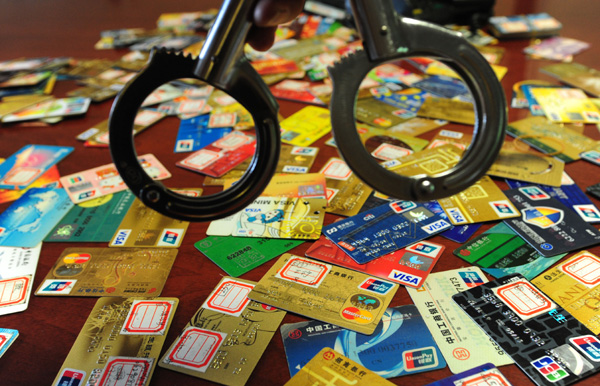Banks urged to be more vigilant about credit card applications
|
Credit cards are confiscated by police during an operation aimed at combating financial crime in Nanjing, Jiangsu province. Provided to China Daily |
Beijing prosecutors called on banks to review credit card applications more carefully, a move prompted by a recent spike in fraud.
Credit card fraud accounted for most of the more than 1,000 economic crime cases that courts in the national capital dealt with from 2010 to 2012, and prosecutors expect the number to keep rising.
Failing to pay balances was the most common offense, while most of the others involved fraudulent credit card applications, the city procuratorate said.
In the past two years, the Chaoyang district has prosecuted 660 people suspected of credit card fraud, while the Xicheng district has prosecuted 264.
"Credit card fraud boomed in 2012 along with our district's fast economic development," said Lu Junzhao, director of financial crime for Xicheng's prosecuting authority.
He said reports of the crime last year were nine times what they were in 2011.
Nearly two-thirds of defendants were unemployed but were able to apply for cards without providing all the required documentation, a key reason for the spike in fraud, he said.
Zhu Haiyan, a prosecutor in Dongcheng district, said people without fixed incomes were the biggest offenders.
Although banks do have strict procedures for credit card applications, many employees have eased qualifications for applicants or even failed to verify identities, Zhu said.
In one case she handled, two defendants succeeded in getting credit cards using a copy of a colleague's ID card. A bank employee saw one of the applicant's signatures was not the ID cardholder's, but approved the application anyway.
Wang Hai was convicted of getting a credit card using fake income and real-estate certificates at a bank in Dongcheng and then running up debt of more than 90,000 yuan ($14,500).
A bank worker named Zeng in Chaoyang even used his position to get a card in his mother's name to improve his work volume and get a bigger bonus, said Ye Ping, a prosecutor in the district.
"For some credit cards with large credit limits, banks pay great attention to applicants' information," said Li Shuang, an employee responsible for bank credit in a Beijing-based financial company. "But with the smaller limits, the process becomes careless, resulting in many unqualified applicants being approved."
Bank staff members' bonuses are tied to how much credit card businesses they get, which also leads them to care more about transaction speed and quantity than about quality, he said.
"Many banks didn't verify credit cards with small credit limits, such as 10,000 yuan, because there were so many applicants and they thought the smaller one wouldn't bring too much risk," Li said.
Although the credit card application needs residents to supply a great deal of personal information and documentation, the banks' negligence and carelessness during verification still provides opportunities for those looking to run up debt.
"In addition, the supervision by the regulatory commission is far from enough," he added.
Lu agreed, saying the banks should warn credit card applicants about the law and keep tabs on their clients' expenses.
"After all, more stringent verification can lower the rate of credit card fraud at the source," Lu said. "Banks should also remind clients to repay and assess clients' credit in line with their overdraft condition, keeping a loss from becoming larger. It's their duty."
He said that his prosecuting authority has already contacted Xicheng's bank regulatory commission to discuss how to develop credit card supervision and establish a platform to share information.
"It deserves to be extended across the capital," he added.
Cui Shaoyu, a 25-year-old credit cardholder, said that she always pays great attention to her account, adding she even once called her bank to explain why she had not repaid in time.
"The interest is high if cardholders don't repay, and I hope to increase my credit limit. So I don't want the bank to remind me in either calls or messages," she added.
However, Zhu said not all cardholders like Cui contact their banks to explain problems, and added that financial institutions should create a "blacklist" of customers who are credit risks.
"Currently, the credit system in China is lagging and has no professional assessment institutions compared with those in Western countries, which isn't good for regulation of the industry," she said.
Banks lack a database they can share with information on clients' credit, so many people can apply for credit cards without all the required documentation, even after they run up a lot of debt.
All the prosecutors interviewed said many people have no awareness of credit card fraud and don't realize that it's a crime.
"Almost 80 percent of suspects or convicts didn't know they had an intentional overdraft, and a few of them even paid one bank's debts with another bank's card," Lu said, adding those who do not repay more than three months after a bank reminds twice will be identified as the intentional overdraft as per the current Chinese Criminal Law.

























